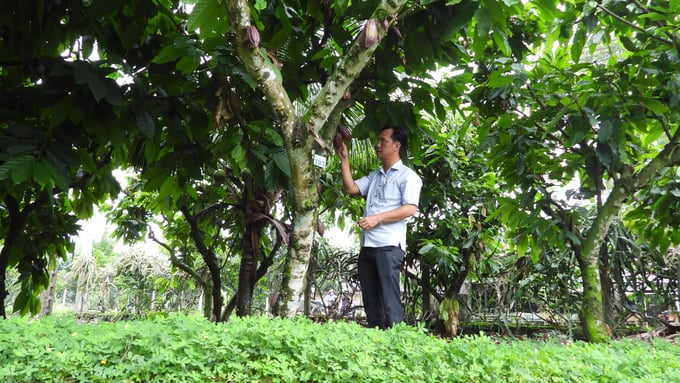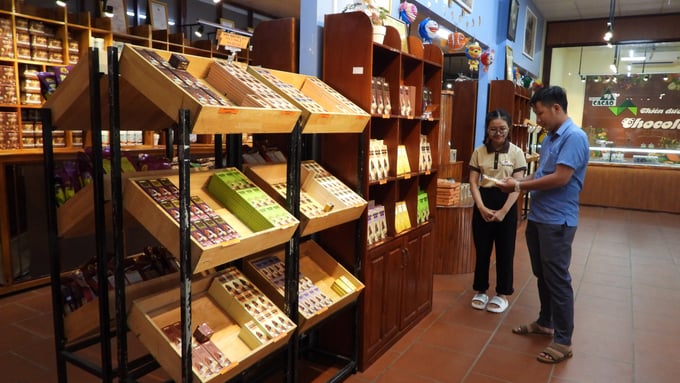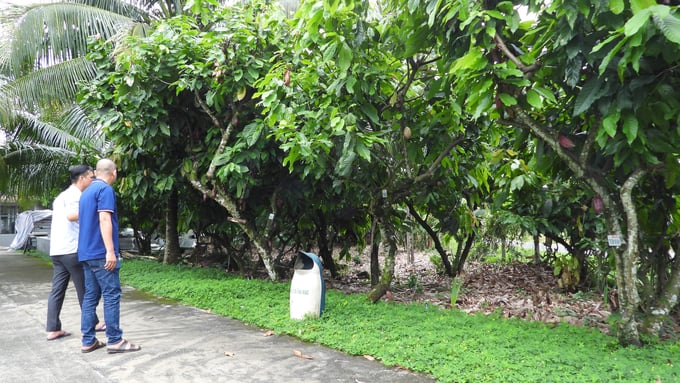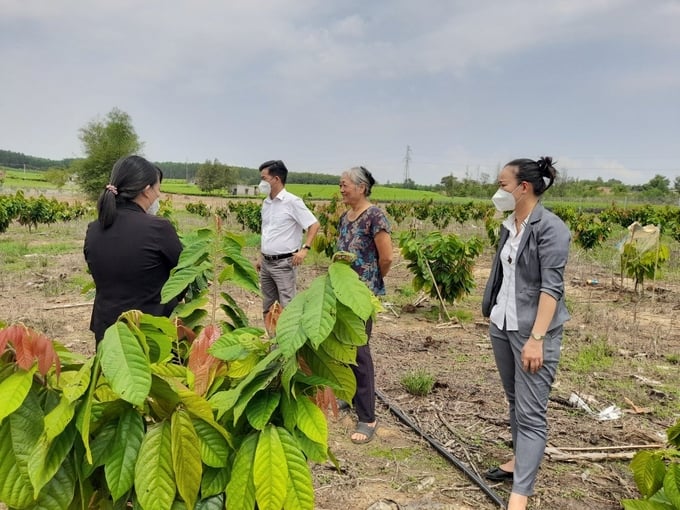May 20, 2025 | 06:53 GMT +7
May 20, 2025 | 06:53 GMT +7
Hotline: 0913.378.918
May 20, 2025 | 06:53 GMT +7
Hotline: 0913.378.918

Cocoa trees in Dong Nai. Photo: Tran Trung.
Scientifically referred to as Theobroma cacao, cocoa trees serve as the principal source of basic materials in the manufacturing process of chocolate, which is commonly called the "food of the gods." Since the 1980s, when farmers in Dong Nai began cultivating this commodity, the sector has remained small-scale and has relied primarily on the export of raw materials to foreign corporations. The national program for the cultivation of cocoa trees was established in 2003. Under the encouragement and support of the government, businesses commenced operations in the cocoa processing and production chain, subsequently expanding their operations to include exports.
Capitalizing on this opportunity, the Trong Duc Cocoa Limited Liability Company was founded in 2005 in the Dinh Quan district of Dong Nai, with the aspiration of bringing the "Made by Vietnam" chocolate concept to life.
Mr. Dang Truong Khanh, the director of the Trong Duc Cocoa Limited Liability Company, which controls the processing technology, stated at the booth showcasing its 4-star OCOP-certified chocolate products that there were virtually no resources in Vietnam pertaining to cocoa and chocolate processing when the company initiated deep processing. The technologies, machinery, and equipment required to process cocoa were essentially nonexistent. Additionally, Internet information was scarcer than it is today.

Mr. Dang Truong Khanh is proud of his deeply processed cocoa products. Photo: Tran Trung.
Mr. Khanh, driven by an unwavering resolve for success and a dedication to safeguarding the raw material source established by his father (Mr. Dang Truong Kham, a pioneer in cocoa cultivation in the area), opted to employ a "trial and error" methodology to devise, enhance, experiment with, and assess the efficacy of diverse products. Subsequent to a series of setbacks that demanded substantial resources and labor, the highest quality "Made by Vietnam" chocolate was ultimately manufactured.
Millions of dollars have been invested thus far by Trong Duc Cocoa Limited Liability Company in its processing facility and raw material area. The organization sells nearly thirty deep-processed products, including chocolate, cocoa liquor, and cocoa powder, in addition to fresh cocoa beans. The aforementioned products have garnered considerable acclaim on the domestic market, with numerous consumers attesting to their superior quality as Vietnamese goods. A number of OCOP products that have achieved four stars have garnered positive reception in discerning markets such as Japan and South Korea.

Processed cocoa products of Trong Duc Cocoa Co., Ltd. are increasingly gaining the trust of consumers. Photo: Tran Trung.
Mr. Khanh asserts that the company's overarching objective during its inception and progression has been to assist cocoa producers in enhancing their livelihoods via cocoa cultivation. Hundreds of hectares of cocoa in Dong Nai were previously threatened with abandonment as a result of volatile market demand. The establishment of extensive cocoa plantations through a partnership between the company and producers has transformed them into high-yielding crops.

Throughout the process of formation and development, Trong Duc Cocoa Co., Ltd. has always set the goal of helping farmers change their lives from cocoa trees. Photo: Tran Trung.
The provincial people's committee of Dong Nai granted approval for the expansive cocoa plantation endeavor with the objectives of facilitating progress, fostering development, and establishing policies and mechanisms. The objective of the endeavor was to establish an 830-hectare cocoa farming region situated beneath cashew trees in the area. The endeavor effectively utilized the collaborative capabilities of governmental bodies, commercial enterprises, and agriculturalists. Furthermore, the Trong Duc Cocoa
Limited Liability Company has forged an intimate supply chain with every cocoa farmer through purchase contracts for fresh cocoa pods priced at a minimum of 5,000 VND per kilogram, in addition to the expansive cocoa plantation endeavor. The actual purchase price has fluctuated between 5,700 and 6,200 VND per kilogram over the past three years.
Moreover, in order to facilitate the prosperity of farmers cultivating their own land, the organization offers monetary assistance to collaborative groups and cooperatives to sustain consistent production. This assistance is provided in the form of progressive costs and managerial costs. The company had allocated 1.5 billion VND by the conclusion of 2021 to provide assistance to producers in the districts of Dinh Quan, Tan Phu, and Thong Nhat in the implementation of cocoa cultivation policies.

Trong Duc Cocoa Company Limited transfers scientific and technical advances to cocoa growers. Photo: Tran Trung.
Concerning new raw material regions, the organization evaluates their potential, collaborates with local authorities, and furnishes pertinent stakeholders/partners with information regarding the economic efficacy of cocoa cultivation. The company collaborates with cocoa producers and provides technical assistance for cultivation once consensus has been reached. In order to increase land efficiency, the organization intercrops cocoa with other commodities, cashew trees in particular.
"The certification of OCOP 4-star cocoa products and the collaboration with Japan to export 'Made by Vietnam' chocolate to the global market will serve as a lever for the company to expedite the process of achieving 100% international standard cocoa cultivation in terms of land area," said Mr. Dang Truong Khanh.
Translated by Linh Linh

(VAN) World Environment Day 2025 (June 5) carries the theme 'Beat Plastic Pollution' continuing to emphasize the global urgency of addressing the plastic waste crisis.

(VAN) This was the assessment shared by experts at the workshop titled 'Assessing the Role and Potential of Low-Emission Rice Production Systems in Vietnam,' held on the morning of May 19.

(VAN) Cai Rong Port is the fisheries control center of Quang Ninh, helping to monitor fishing vessels, combat IUU fishing, and remove the EC's 'yellow card'.

(VAN) The German Agricultural Society (DLG) explores the possibility of establishing a mechanization service center in Vietnam’s Mekong Delta to support farmers in accessing and utilizing advanced machinery.

(VAN) On May 16, the Department of Water Resources Management, in collaboration with the Food and Agriculture Organization of the United Nations (FAO), held a signing ceremony for the GEF-8 project document.

(VAN) Food safety, mechanization, vocational training, and market opening are key areas of cooperation expected between the Vietnamese Government and the Federal Republic of Germany.

(VAN) Deputy Minister Nguyen Quoc Tri also expressed his hope that Cuba will soon overcome its current challenges, attain food security, and further expand cooperation with Vietnam.